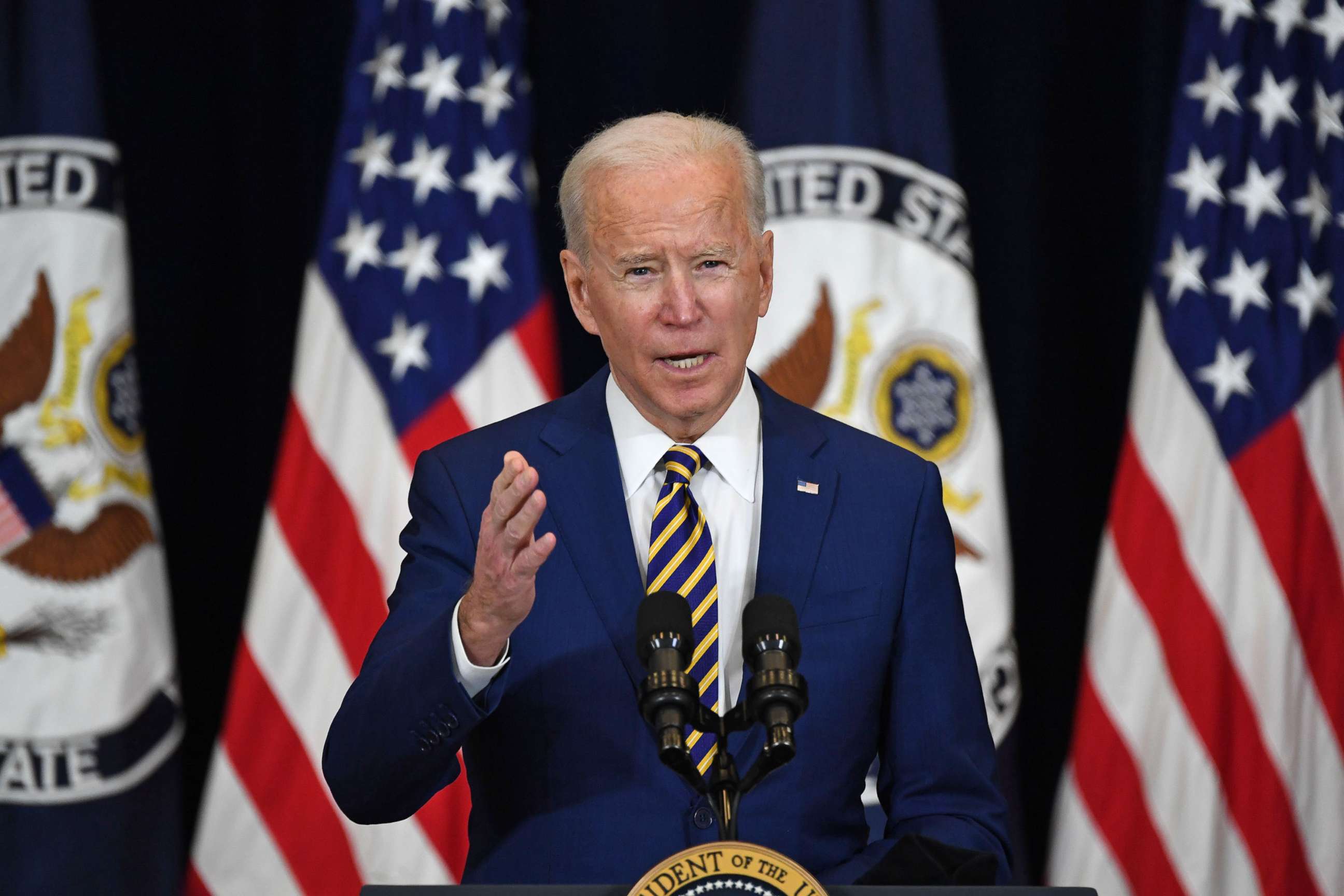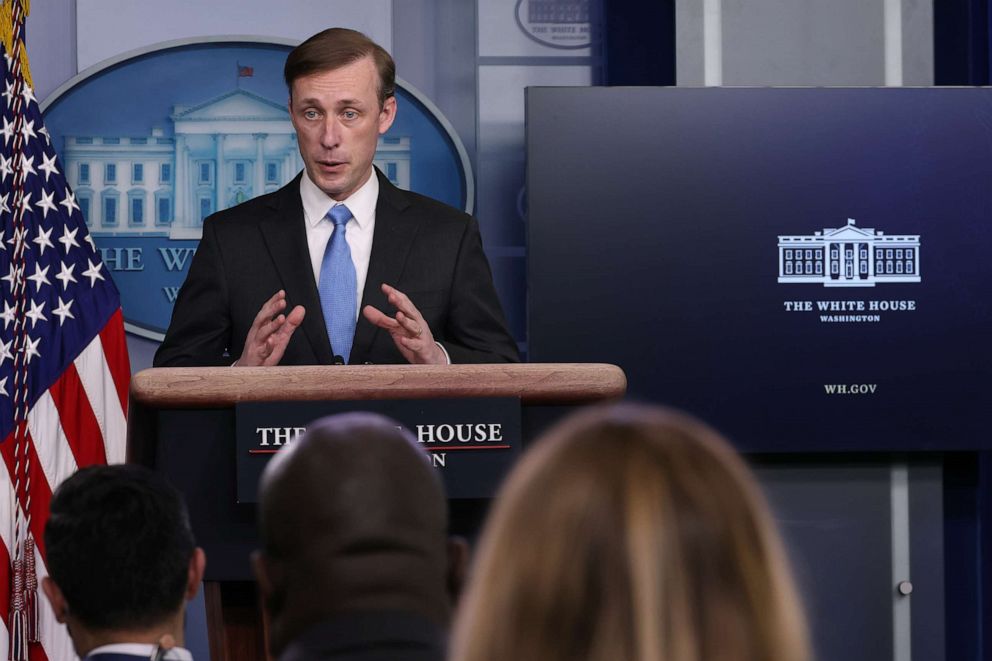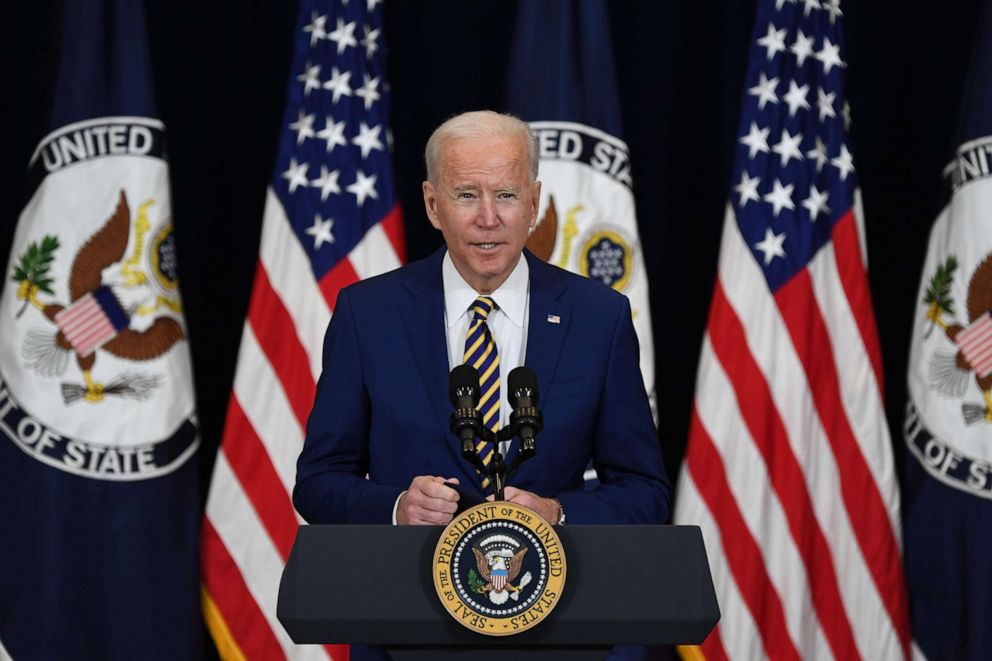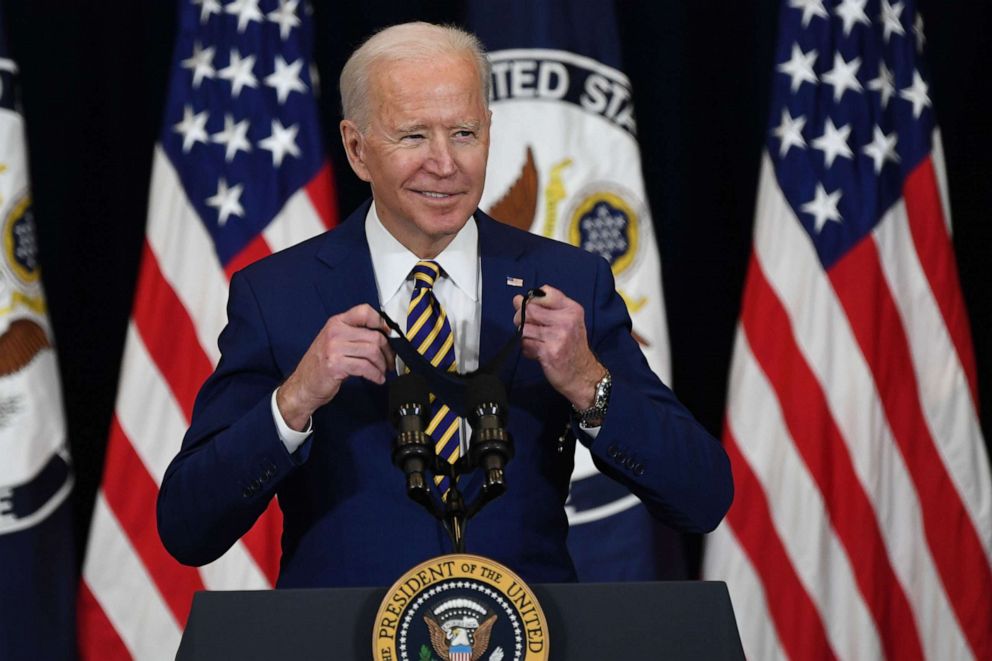Biden takes actions to protect LGBTQ rights worldwide, allow more refugees in US
He made the announcements in his first major foreign policy speech.
President Joe Biden on Thursday delivered his first major foreign policy speech during a visit to the State Department where he signaled he would place diplomacy at the center of U.S. foreign policy.
"America is back," Biden told State Department staff who had assembled in person and virtually to hear him deliver a separate address beforehand. "Diplomacy is back. You are the center of all that I intend to do. You are the heart of it."
He also signed a presidential memorandum on Thursday that he said would "reinvigorate our leadership on the LGBTQI issues and do it internationally."
"We'll ensure diplomacy and foreign assistants are working to promote the rights of those individuals included by combatting criminalization and protecting the LGBTQ refugees and asylum seekers," Biden said.

In addition, the president said he approved an executive order to begin the process of raising the maximum number of refugees allowed into the U.S. every year to 125,000, beginning in fiscal year 2022, which for the U.S. government begins on Oct. 1. Former President Donald Trump had slashed the total number to 15,000, and raising it involves a process in which Congress plays a role.
"I'm approving an executive order to begin the hard work of restoring our refugee admissions program to help meet the unprecedented global need," Biden said. "It's going to take time to rebuild what has been so badly damaged, but that's precisely what we're going to do."
The International Rescue Committee's vice president of resettlement, asylum and integration, Hans Van de Weerd, told ABC News the move was "great news for refugees," but he did not expect numbers to rise immediately.
"The way that the president announced this news -- really going back to the values of the country, the values of welcome and really expressing that the U.S. wants to take a role -- that was a very important moment," he said.
At the State Department, the first federal agency he has visited in person as president, Biden announced an end to U.S. support for the Saudi-led military campaign in Yemen. The halt would not include U.S. action against al-Qaida in the Arabian Peninsula, Biden's national security adviser, Jake Sullivan, told reporters earlier in the day.

The Trump and Obama administrations had backed Saudi Arabia in its fight against Iranian-allied Houthi rebels in Yemen, but the kingdom's offensive had drawn condemnation for alleged human rights abuses, with the Trump administration eventually dialing back support.
Since taking office, Biden froze a U.S. arms sale to Saudi Arabia, as well as another sale to the United Arab Emirates, which is part of the coalition fighting the Houthis.
"Stopping U.S. military support to the Saudi-led coalition was expected, but it will not prevent the human suffering that is happening in that country," said Mick Mulroy, a former Defense Department official and CIA officer who is now an analyst for ABC News. "There needs to be a comprehensive international plan, preferably led by the United States, to support the United Nations in attaining a lasting peace agreement and taking Yemen from a failed state to a fragile one and eventually to a fully functional country."
The president did not give a full view of his foreign policy doctrine at the State Department but rather wanted to focus on "his early decisions and actions," Sullivan said.
Sullivan said Biden had so far acted in five lanes: domestic investments "to shore up our country's foundations," "revitalizing America's alliances," a commitment to multilateralism by "re-engaging key institutions and agreements," "reasserting our values," and "making sure that our global force posture is consistent with our national security and diplomatic priorities."
"We must meet the new moment ... of accelerating global challenges, from the pandemic, to the climate crisis, to nuclear proliferation, challenging the will only to be solved by nations working together and in common. We can't do it alone," Biden said.
In fact, rolling back former President Donald Trump's nationalist approach to the world -- which Trump had termed "America First" -- has already become a hallmark of Biden's short time in the White House.
Biden has returned the United States to international agreements and organizations his predecessor left -- including the Paris climate accord and the World Health Organization -- and has endorsed a multilateral approach to issues ranging from the COVID-19 pandemic to China and Iran.

"America's alliances are our greatest asset," the president said Thursday. "And leading with diplomacy means standing shoulder-to-shoulder with our allies and key partners once again."
The State Department itself has been left battered after Trump sidelined the agency, with proposed budget cuts, taunts against the "deep state" department and political retaliation against career diplomats.
Biden told staff there that it would be different in the years ahead.
"In our administration, you're going to be trusted, and you're going to be empowered," he said. "Trusted and empowered to do your job."
Biden did not address every hotspot, but he did reserve tough words for Russia, whose president, Vladimir Putin, he said he would treat differently than Trump had. He called on Russia to immediately release opposition figure Alexei Navalny and called out "the determination of Russia to damage and disrupt our democracy."
"I made it clear to President Putin in a manner very different from my predecessor, that the days of the United States rolling over in the face of Russia's aggressive actions, interfering with our elections, cyber attacks, poisoning its citizens, are over," Biden said, referring to a call he had held with his Russian counterpart. "We will not hesitate to raise the cost on Russia and defend our vital interests and our people."

Biden said that he would be willing to "confront" China when necessary but would also be willing to work together at other times.
And echoing a statement he had issued earlier in the week on the Myanmar military's takeover -- which the United States has labeled a "coup" -- he called on the military to "relinquish power they have sieged, release the advocates and activists and officials they have detained, lift the restrictions on telecommunications, and refrain from violence."
The president's afternoon trip to the State Department also included a meeting with State Department career officials from both the foreign service and civil service, Sullivan said.
Biden had originally planned to visit the State Department Monday, but his remarks were delayed because of a snowstorm that hit Washington, according to the White House.
ABC News' Justin Gomez and Conor Finnegan contributed reporting.



